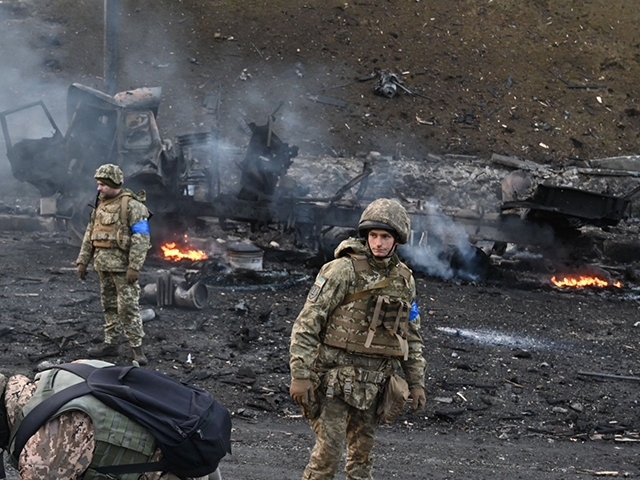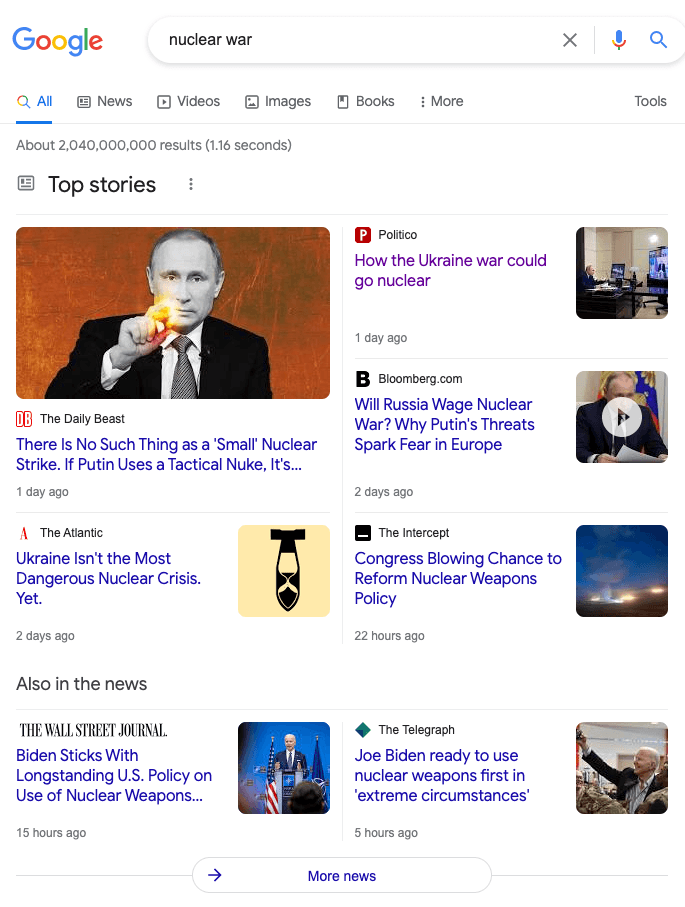President Joe Biden is trying to protect Ukraine from further Russian escalation by publicly expanding policy justifications for a U.S. nuclear attack, according to a report in the Wall Street Journal on Friday.
The leaked expansion reverses his 2020 campaign pledge, which declared that the “sole purpose” of U.S. nuclear weapons would be the deterrence of a nuclear attack.
The reversal was leaked to the Wall Street Journal as U.S. officials worry that Russia might escalate the border war in Ukraine amid the crippling setbacks caused by U.S.-supplied anti-tank missiles, anti-artillery drones, and economic sanctions. Some members of Biden’s administration — and many progressives — are pushing for a huge victory against Vladimir Putin, while other officials are looking for a compromise that would end the territorial dispute and avoid a nuclear war.
A growing number of U.S. experts and advocates are warning Biden’s team of nuclear war amid the confusion and emotion of the high-stakes battle, in which Russia is purportedly trying to recover Russian-majority provinces from breakaway Ukraine.
Biden’s new policy says the “fundamental” — but not the sole — purpose of the U.S. nuclear armory will be the deterrence of foreign nuclear attacks, according to the Journal:
That carefully worded formulation, however, leaves open the possibility that nuclear weapons could also be used in “extreme circumstances” to deter enemy conventional, biological, chemical and possibly cyberattacks, said the officials.
The “extreme circumstances” policy returns the United States to the policy used in the Cold War, the Journal reported:
During the Cold War, the U.S. reserved the right to use nuclear weapons in response to a conventional attack to offset the Soviet bloc’s numerical advantage in conventional forces. After giving up its chemical and biological weapons in accordance with arms-control treaties, the U.S. later said it was reserving the right to use nuclear weapons to deter attacks with poison gas and germ weapons in some circumstances.
NATO allies favor the revived Cold War strategy, the newspaper said:
“Allies were concerned that moving too far away from current posture would leave them vulnerable—in theory or in practice—to Russian threats,” said Jon Wolfsthal, who served as the senior arms control and nonproliferation official on President Obama’s National Security Council.
The policy change, and the media leak, are likely intended to deter the Russians from escalating the war in Ukraine.
But the vague language in the policy is also intended to avoid a fixed “red line” that could spur U.S. escalation after a Russian escalation, for example, if the Russians used a nuclear bomb to frighten Ukraine’s government into giving up the border provinces.
The conflict is over the borders and political status of Ukraine.
Progressive advocates in the West demand the country be free to join NATO and buy foreign weapons.
Russian officials insist that Ukraine is a historic province of the Russian homeland, that an independent Ukraine should be kept out of alliances, and that Russian-populated districts in Ukraine should be returned to Russia. The Russian invasion began after Western governments repeatedly hinted that Ukraine could join NATO and need not accept Russia’s political terms.
A growing number of U.S. experts and advocates are warning Biden’s team of the growing danger of nuclear war. Politico reported on March 24:
Not since the Cold War has the specter of nuclear war hung so heavily over a president’s crisis diplomacy.
As President Joe Biden meets with fellow NATO leaders, calls for a ceasefire in Ukraine are growing more urgent than ever — to alleviate the widespread human suffering but also to dial back what veterans of nuclear planning consider an alarming potential for it to spiral into a clash of atomic superpowers.
“Because of a month-old war between Russia and Ukraine, over who shall control Crimea, the Donbas and the Black and Azov Sea coasts of Ukraine, America seems closer to a nuclear war than at any time since the Cuban missile crisis of 1962,” populist advocate Patrick Buchanan wrote in a March 25 article for RealClearPolitics.
The article is headlined “Is Victory for Ukraine Worth Risking Nuclear War?” and it argues:
The longer the war goes on, the greater the likelihood Putin resorts to indiscriminate bombing and shelling to kill off the resistance, and the greater the possibility that the war expands into NATO Europe.
Meanwhile, in the secure American homeland, 5,000 miles from Kyiv, there is no shortage of foreign policy scholars beating the drums for a “victory” over Putin’s Russia and willing to fight to achieve that victory — right down to the last Ukrainian.
There is some evidence that the Russians are trying to ease future negotiations by carefully limiting the damage.
Also, the Russians seem to be giving up their major attacks near Kyiv and are concentrating their forces in the Russian-majority region called the Donbas. The Financial Times reported Friday:
Speaking at a defence ministry briefing in Moscow on Friday, Sergei Rudskoy, a high-ranking official in the Russian army, said what the Kremlin has labelled a “special operation” in Ukraine was entering a new phase designed to fully “liberate” Donbas.
…
“The main aims of the first phase of the operation have been fulfilled,” said Rudskoy, head of the Russian army’s main operations directorate of the general staff. “The military capacities of Ukraine’s armed forces have been significantly decreased, which allows efforts to be focused on achieving our main aim: liberating Donbas.”
The Donbas area is the Russian-majority region on the eastern side of the Ukraine territory.


COMMENTS
Please let us know if you're having issues with commenting.